I don’t want summer to be over because I find it inconvenient to wear sweaters.
This month has a content warning because the first book I finished this month is a non-fiction about domestic violence.
Less upsetting is that I took it as a chance to talk endlessly about Beauty and the Beast and The Little Mermaid again, but, I did in fact do that also, so be warned.
Why Does He Do That? by Lundy Bancroft
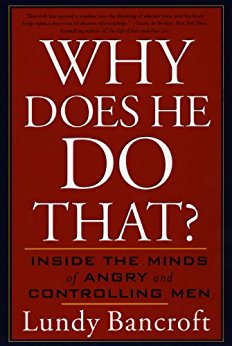
I started the month off right with some light reading about how abusive men think and the ways they get rewarded for being abusive and the ways that culture enables them in being abusive and/or not suffering any consequences. This is a very good book that very clearly explains the mentality of all types of abusive men written by a guy who has counselled abusers for a long time and has lots of expertise on the subject. It’s written mainly for the partners of such men, past or present.
I didn’t read it because I know an abuser or a victim (thankfully), but instead because I wanted a more thorough understanding of this topic that is still unfortunately very misunderstood. Early on in the book he makes a list of common misconceptions about abusive men (like how people think they tend to be alcohol and drug abusers, mentally ill, victims of abuse in the past, or that abuse mostly happens within certain races or religions, etc) and apparently while sometimes abusers are those things, usually not, and abuse happens in every culture, race, religion, etc, and really all you need to create an abuser is for a person to decide to be an abuser.
This is good for any intersectional work I might try to do in day-to-day conversations in destigmatizing substance abuse, mental illness, past trauma, and, like, race, but it also means that “fixing” an abuser requires the abuser to actually decide to stop abusing, which, according to Lundy, even with good counselling, is very rare.
There was one part that made me raise my eyebrows though. It was really, really short, and it was ultimately fine, but, OK, here goes, because I’ll take any and every opportunity to go on and on about Disney. Lundy’s talking about how the media contributes in the normalizing of abusive relationships between men and women and the devaluing of women’s agency and autonomy in our culture, and mentions two Disney movies.
Beauty and the Beast, because it is entirely a narrative about how a woman’s kindness and being in love with her transforms a dude from angry and violent (Lundy is adamant, refreshingly, I found, that “violence” doesn’t necessarily have to be physical violence, so even threats of violence or slamming things or throwing things around to cause fear is violence all on their own… oh, Beast) to kind and gentle.
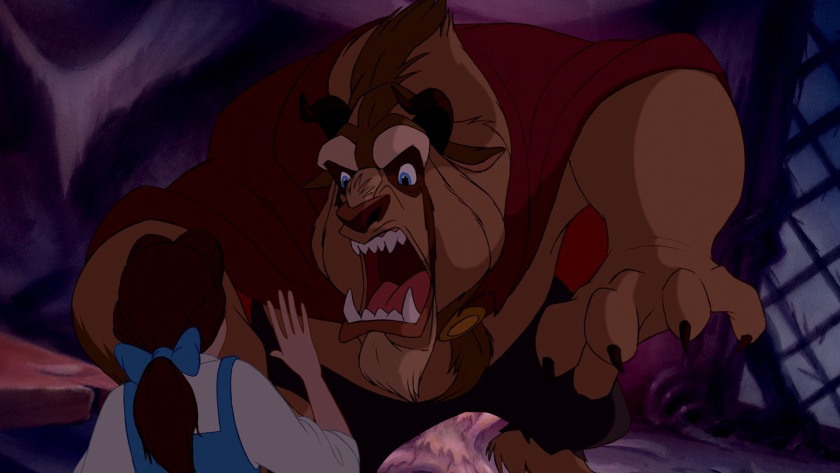
Well, but, uh –
Fine. I personally maintain that whole thing is how it is because no one listened to Howard Ashman, who wanted the Beast to be a little boy at the beginning which would have lent him a little more sympathy and his arc maybe would have been less problematic with the whole “cursed as a child” thing being the beginning of it – just because I think it turned into a self-flagellation thing about how monstrous masculinity is or something, at least, from my perspective, that’s what it looks like. They made the whole thing about controlling his temper when that was probably a really stupid thing to do in retrospect because the “you can change him” thing is pretty insidious, and it’s probably why his “temper” is barely even a thing in the new version. He’s just a huge, rude, grumpy cynic. Although he does still scream at her when she goes near the rose. (I used the word “thing” 7 times in this paragraph, 8 if you count it as a suffix. I decided to just bold them all rather than edit because I’m awesome like that.)
So, whatever, I still think Beauty and the Beast was going for something lofty about masculinity with the characterization of the Beast but because Belle doesn’t have anything to learn and because the Beast learns basically nothing himself, it is kind of as Lundy says it is. There just isn’t enough in the movie to confidently state that Belle and magical, perfect, pedestal-perched femininity isn’t being portrayed as the thing to “tame” angry men and save them from themselves. Sigh.
But then Lundy makes a flippant comment about The Little Mermaid! You know the flippant comment I mean, the one everyone makes: how dare Ariel trade her voice for a man, obviously she has no sense of self worth and Disney is evil. I’m paraphrasing but that’s the gist of the comment we all know and love.
Sooooooooo OK Ariel does that because she’s a kid, Ursula tricks her into doing it because if she’d just let her go up there with her voice then everything would have been fine and Ursula is trying to take over the ocean, and it’s all King Triton’s fault, you know, the guy who at the end learns that he has to let his daughter make her own choices and turns her into a human with her voice and everything.
And I love Eric! He’s so friendly and dog-rescue-y and is really nice to Ariel even though she’s a mess. Imagine not remembering that Triton is the one who fucks up and thinking that the major problem in the entire movie is that Ariel likes Eric too much for her own good. I mean if anyone’s abusive…
https://www.youtube.com/watch?v=oAH-qhpHQOs
BTW how does the movie feel about this?
Well Triton regrets it 2 seconds afterwards, so.
And doesn’t the fact that Eric falls in love with Ariel because of her voice and consequently doesn’t want to start up a thing with her when he thinks she can’t talk count for anything? Like, yes, she should have self-worth apart from Eric, how she feels about Eric, and how he feels about her, but it was 1989 and the movie is only 90 minutes long and is entirely about how Triton needs to get over himself.
Anyway it’s fine, because Lundy’s point isn’t that these stories cause abuse, just that they indicate deeper problems inherent in the culture and that they need to be consumed with a healthy dose of critical thought, which of course I agree with a tonne. Even in the case of The Little Mermaid, which I think is fantastic and endlessly defensible, I think it’s important to note just how important the romance aspect is to everything that Ariel does because this is typical of female characters and while romance is not inherently bad, and while many of us want even more romance in every story ever, I’m gonna go ahead and say that it is inherently bad that the most prominent character arc female characters in general have is falling in love. Often she’s falling in love with a man. Often, in fact, the arc is her falling in love with a man against her will. Female characters need variety, because if every girl hero a girl has while she’s growing up is mostly concerned with falling in love with men that is going to contribute to the stupid idea that women and girls have to have their self-worth given to them by men who are romantically interested in them. PS: hello, Mulan, Nani, Merida, Anna, Elsa, and Moana! Some of you even have romance subplots on the side but you get to do other things too, yay!
OK back to the extremely important and heavy subject at hand. There were many references to specific cases of physical assault, but the part that stood out most vividly for me was the section about abusive men harming their partners through their children. The two examples that ruined my month were a guy who fed his newborn spoiled milk (which made him sick) to punish his wife for something stupid, like coming home late. Not that there’s… ever a good reason to do that. The other was less life-threatening but wow: a man was having a verbal argument with his wife, told her to stop or she’d be sorry, she didn’t stop, so he went to their daughter’s room and shredded her prom dress.
I can’t even imagine that. I didn’t even go to prom. I never even ever felt the slightest desire to go to prom, but still. Imagine your dad ruining something that important to you to get at your mom through your pain. How do you even begin to deal with that?
And that’s why I went on and on about the Disney references, because with everything else this book discusses, I’m just kind of left speechless. What do you say, other than, “Can we… start over? Scrap the world and start again and make sure this isn’t as prominent, or even a thing at all?”
So. Yeah. This is a good book and I think it has probably helped a lot of people in abusive situations or who have left abusive situations, and also I hate the world.
Wolves and Witches by Amanda C. Davis and Megan Engelhardt
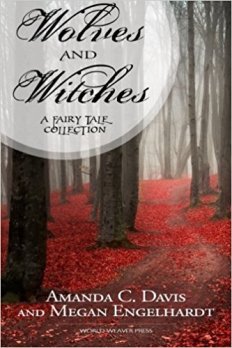
This is a collection of short stories and poetry – retellings of fairy tales or just new fairy tales. So in other words, this is my favourite type of collection.
I liked all of the poetry, I liked both reimaginings of Rumpelstiltskin, and my favourite was the last story, called “Questing for Princesses” which features a guy who is a prince and is too busy to go rescue women from dragons and death-sleep and enchanted towers and all that stuff (I’m pretty sure every princess fairy tale is referenced in this one). An enchantress tries to entrap him into reinacting the Beauty and the Beast plot but he foils her by just letting her stay and take shelter. Other people try to entrap him into basically every princess plot but he’s too busy being practical. It’s very clever and cute the whole way through and is a must, IMO.
Monstress: Volume 1 by Marjorie Liu and Sana Takeda
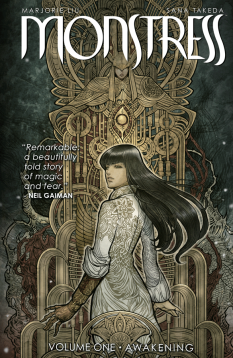
Welp. It’s pretty. And dark. It made me feel icky, though. There’s far too much… child-eating. And child-enslavement. I like the prominence and variety of female characters and I like that except for Kippa, they’re all morally ambiguous to varying degrees, and I also like all of the talking cats, but I don’t know if I have the stomach to read Volume 2.
The Mark of the Dragonfly by Jaleigh Johnson
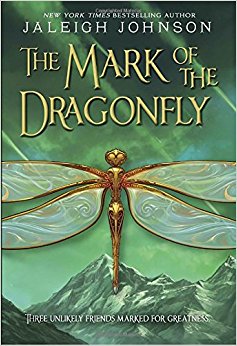
I enjoyed it. I didn’t love it, but I did love specific things about it:
- the main character is an engineer girl (whether the twist related to engineer girling takes away from Piper engineer girling I haven’t decided. I think it kind of does, and kind of doesn’t. But regardless of what happens she’s still an engineer girl)
- much of it takes place on a cool train
- importance of female friendship highlighted, super cool
The Sun is Also a Star by Nicola Yoon
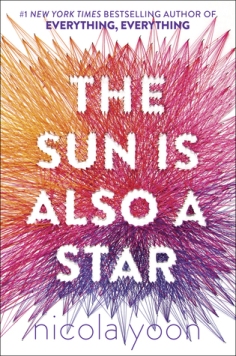
While I really liked it, the cynical part of me wishes this wasn’t another romance narrative about a guy talking a girl into participating in the romance narrative.
The guy (Daniel) is a romantic and a dreamer and believes he and the girl (Natasha) were meant for each other, having just met. Natasha is a realist and a science-enthusiast and is being deported the next day so spends a good chunk being coerced into “love.” Not just love, though, but, like, “soul mates” kind of love. And I’m meh on that.
Natasha has a lot of good reasons to not be interested currently, which I know is what creates the tension, but it also left me occasionally annoyed. Daniel is a decent fictional guy but the number of times he outright states, to her, like, to her face, that they are meant to be was too high and quickly became grating. I’d have liked it better if he had toned it down a little. Internally he could believe what he wants, and he might even hint at it to her, but maybe if he’d said things like “we won’t know if we don’t try” or, like, anything except “we’re meant to be” after a couple of hours together, it would have been less annoying.
Ah but maybe I’m ice-hearted. It’s probably a bit of both.
Anyway it has a really intriguing style. I see Yoon being compared to John Green and, having only read this one of Yoon’s and having read none of Green’s, I’m going to hesitantly say that’s a good comparison.
An Extraordinary Union by Alyssa Cole
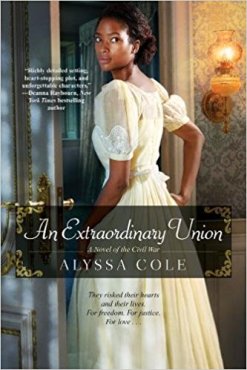
This is a romance set in the Civil War era south, and I can’t remember exactly where they were but it’s not important. It reminded me a lot of a Courtney Milan book which, of course, means I liked it a lot. The protagonist is posing as a mute slave and she has a photographic memory, the love interest is one of those cocky, confident Scottish guys you’re always reading about posing as a rebel soldier, and they have a lot of discussions about race and racism and power dynamics in and around all of the sex.
So, I mean, it was educational. I’m starting to think I prefer my romance historical, because everything just seems to work much more easily and, in this book’s case especially, the setting and subplots get to be really interesting too.
Lumberjanes: Beware the Kitten Holy
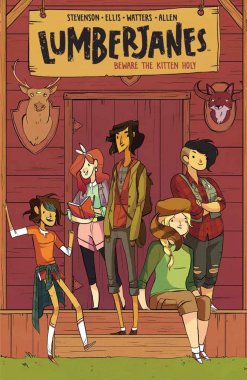
Can I just say that I loved it and leave it at that because I loved it. And I’m going to read the next one. Now I’m literally going to go google when the next one is coming out, or if it’s already out, and I’m excited.
**There are like 5 more volumes out already of this and I am SO HAPPY**
(Yeeeeeeah I only read 7 this month what of it)




Great reviews! I do hope you realize you’re making all the rest of us feel horribly guilty and inadequate ‘cos we’re watching soaps instead of worthily reading books?x
One of my profs told us that all of the soap writers are literary nerds so you’re probably getting all the same stuff anyway, just filtered through a different lens. 🙂